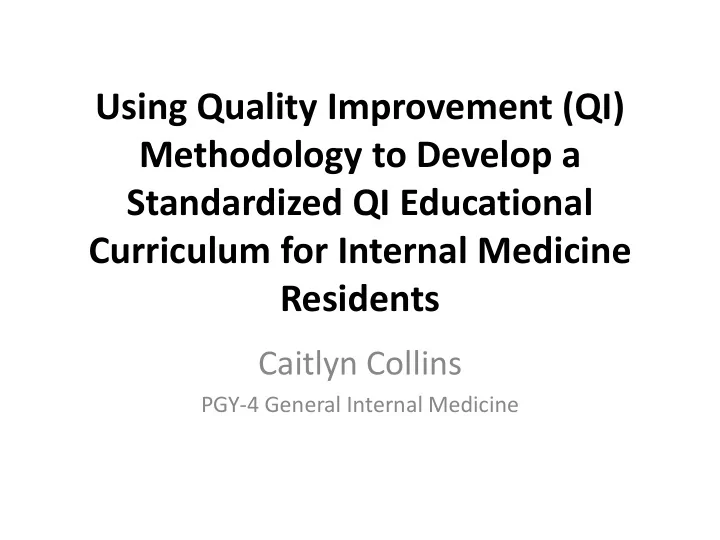

Using Quality Improvement (QI) Methodology to Develop a Standardized QI Educational Curriculum for Internal Medicine Residents Caitlyn Collins PGY-4 General Internal Medicine
https://www.videezy.com/free-video/blur https://blog.producthunt.com/how-will-the-world-change-over-the-next-50-years-5355e10ea30c The hospital is a bustling and complex environment.
https://www.istockphoto.com/ca/photos/light-bulb Knowing how to create positive change can be daunting for learners and physicians alike.
https://www.nationalgeographic.com/adventure/features/your-shot-photography/your-climbing-photos/ Attempting to identify deficits and find solutions to benefit patient care can seem impossible.
http://storiesfromschool.org/class-size-and-deathless-prose-clamor-in-the-classroom/ Fortunately, residency training now places an emphasis on learning about quality improvement (QI).
QI Improvement Training • The need for residents and physicians to have the understanding and ability to take part in quality improvement (QI) initiatives has become increasingly important • Participation in a scholarly project is an accreditation standard and is part of the Canadian Royal College Certification in Internal Medicine • Residents previously encouraged to take part in QI projects, however most did not have a framework or the QI knowledge needed to translate a project into reality
Using QI principles to develop a QI curriculum
Defining Opportunity • Problem Statement: Currently, core internal medicine residents at the University of Alberta do not have a standardized quality improvement (QI) educational curriculum. This limitation impacts the number of QI physician champions who can teach QI and actively support QI projects.
Defining Opportunity • Aim Statement: To develop and implement a standardized QI curriculum using QI principles by June 2018. Objectives were to: 1. Provide core internal medicine residents the Evidence- based Practice for Improving Quality (EPIQ) training course, 2. Have resident teams develop potential QI projects during the course, 3. Identify resident QI champions to coach future EPIQ sessions the next calendar year, 4. Where appropriate, align residents to active QI projects with staff physicians and multidisciplinary teams within the AHS quality management framework (QMF).
Where did the gaps exist?
Building Understanding
Act to Improve: PDSA #1 • Time was allocated during 3 academic half- day times to complete the EPIQ training course • Residents were grouped into teams of 6-10 to develop potential QI projects and work through the 10 steps of EPIQ • 100 PGY-1s, PGY-2s and PGY-3s completed the EPIQ course
Act to Improve: PDSA #1 • April 12, 2018 – each group presented their potential QI project ideas at academic half-day • All group presentations were evaluated by a designated QI consultant
Act to Improve: PDSA #1 • QI Project Ideas: • Daily weights measurement • Transition from IV to po antibiotics • Handover • Time to complete a consult in the ED • Goals of care documentation • Delirium in hospital • Colonoscopy preparation • Prophylaxis for patients on steroids • Creatinine ordering for dialysis patients • Paging process
Results • Post-course surveys were completed to evaluate: • Understanding of QI principles • Likelihood of residents to take part in future QI projects • Interest in learning more about QI • Interest in being an EPIQ facilitator
Post-Course Survey Results • 52 residents complete the survey • Pre-EPIQ:
Post-Course Survey Results • Post-EPIQ:
Post-Course Survey Results • 56% absolute increase in understanding of QI principles • 15% absolute increase in interest in pursuing a QI project • 17% of residents are interested in EPIQ course facilitation • 94% of PGY-2 and PGY-3 residents preferred this method of learning QI to the previous years
Next Steps… • Continuing to encourage residents who have completed the course to join staff physicians and multidisciplinary teams to develop and complete QI projects • 38 internal medicine residents completed the AHS AIW yellow belt certification and 18 residents involved in active QI projects
Next Steps: PDSA #2 • 5 groups planned for the current R1 cohort – December 2018 • Residents will be encouraged brainstorm potential QI project ideas prior to attending EPIQ • Each group will complete a pre- and post-course test and survey completed on the day of the EPIQ course
https://www.istockphoto.com/ca/photos/learning?excludenudity=true&mediatype=photography&phrase=learning&sort=mostpopular Residents and staff physicians are being trained in QI principles and methods.
https://photographylife.com/landscapes/how-to-photograph-clouds Working through problems using QI principles gives residents the tools to create positive change in our hospitals.
https://www.istockphoto.com/ae/photos/group-of-friends?excludenudity=true&sort=mostpopular&mediatype=photography&phrase=group%20of%20friends Now, more residents are involved in QI projects than ever before.
https://evelynparham.com/5-favorite-quotes-to-inspire-positive-change/ As more residents are trained in QI, our goal is to have the curriculum sustained by residents, thereby fostering an atmosphere within our healthcare system to create ongoing positive change.
Questions? • Special thanks to: Pamela Mathura Dr. Narmin Kassam Dr. Anca Tapardel Reference: EPIQ Workshop Development Committee. Evidence-based Practice for Improving Quality (EPIQ) QI Workshop. Canadian Neonatal Network, Toronto. 2018
Recommend
More recommend